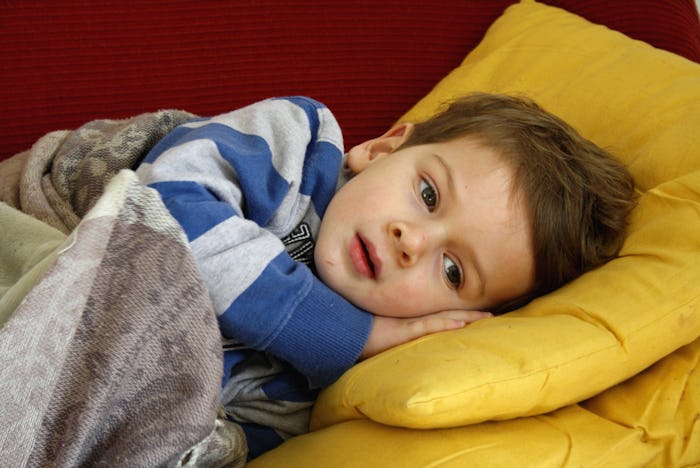If you're concerned about your little one catching the flu this season, you're definitely not alone. This year's flu is reportedly the worst and most widespread in a long time, and young children are among the most susceptible to catching it. Since colds and viruses are rampant this time of year, it can be tricky deciphering between a bad cold and the flu — after all, most of the symptoms are the same. But what if your kid's temperature is fine? Here are some signs that your toddler has the flu, even if they don't have a fever.
Most people that get the flu will feel better in several days — the average length of flu is about a week. But sometimes complications can occur, especially in those with compromised immune systems or previous, underlying conditions (kids with asthma, particularly, should receive immediate and appropriate treatment). Though high fevers can be a common indication of the flu, not everyone with the flu will have a fever, as noted by The Washington Post. As parents, it's important to be vigilant about noticing other signs and symptoms that are flu-like in order to make sure your little one can get the best care as soon as possible.
So, how do you know it's the flu, especially if your child doesn't have a fever?
It's A Sudden Onset
While you may start noticing symptoms of a cold over the course of a few days, the onset of the flu is very different. As noted by the Centers for Disease Control and Prevention (CDC), the flu comes on suddenly and strongly. And, while a fever with a cold might last a day or two, high fevers with the flu can last much longer than that.
Body Aches
Body aches are a tell-tale sign of the flu, according to Parents. Preschool aged children will often complain about their arms and legs hurting, and may even complain of a headache. Your normally active kiddo might be laying down on the floor or couch and not wanting to move at all. Fatigue goes hand-in-hand with body aches, and you might notice your child napping or sleeping much more than typical. As noted by the website for Dr. Sears, ibuprofen and warm baths or hot water bottles can help to easy achy muscles and provide relief from headaches.
Decreased Appetite
A decreased appetite can be common in bad colds, but is almost a definite sign of the flu, according to Kids Health. If your kid is not up to nibbling on crackers, or reluctant to even drink water, it could be the fatigue and body pain of the flu at work. Some kids respond to popsicles or juice better than anything else, and since dehydration is always a concern with illnesses, it's a good idea to let them drink or munch on whatever they have a taste for (within reason, of course).
Chest Pain And/Or Cough
As the CDC noted, chest discomfort and coughs are common with the flu, and can often be severe. The cough could appear dry or productive, and your child may complain of pain in their chest or while coughing. Because chest pain can be a sign of more severe illnesses (like pneumonia), it's always a good idea to talk to your pediatrician right away when your child says their chest hurts — especially if it seems like they are having shortness of breath or difficulty breathing.
The flu has been a serious news story this year as it seems the strain going around is more severe than experts initially thought. This can cause extra worry or panic in parents who think their child has the flu, but the truth is that for the majority of children and adults, a quick and complete recovery is more than likely. Fast treatment is most helpful when it comes to the flu, so be sure to talk to your doctor as soon as you notice any signs that your child could have more than a cold.
Check out Romper's new video series, Romper's Doula Diaries:
Watch full episodes of Romper's Doula Diaries on Facebook Watch.
